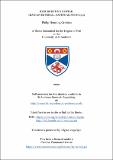Resurrecting empire : Iranian imperial nationalism in 1919
Abstract
Narratives of the late Qajar period have considered Iran a country in decline, unable to engage effectively with British and Russian modernity, spearheaded by imperial practices. Yet, in truth, this account requires a re-appraisal. This thesis examines the dialectic between a pre-modern Iran and the modern forces Iran faced and will show how Iran engaged with and applied western achievements which were eventually used in an Iranian paradigm.
This thesis focuses on Iran’s diplomacy after the First World War and, in particular, Iran’s attendance at the Peace of Paris in 1919. It will show that Iran followed a persistent and lengthy pursuit to reclaim territory and was to put forward a nationalist programme which sought a sovereign and independent Iran. This nuanced nationalism, an imperial nationalism, used modern methods and sought integration into the post-war world order.
Using previously unused primary sources, this thesis will interrogate Iran’s loss of territory and examine how this informed Iran’s post-war diplomacy. In doing so it will highlight an under-researched area and show that Iran espoused a far more consolidated nationalistic approach in 1919 which included an increasingly modern and professional diplomatic approach. Modernity and imperialism helped to precipitate the loss of territory, however, the loss of territory informed Iran’s distinct nationalism in 1919. An imperial nationalism, which was founded on a framework of empire locked into ideas of sovereignty.
Type
Thesis, PhD Doctor of Philosophy
Rights
Creative Commons Attribution-NonCommercial-NoDerivatives 4.0 International
http://creativecommons.org/licenses/by-nc-nd/4.0/
Collections
Except where otherwise noted within the work, this item's licence for re-use is described as Creative Commons Attribution-NonCommercial-NoDerivatives 4.0 International
Items in the St Andrews Research Repository are protected by copyright, with all rights reserved, unless otherwise indicated.


